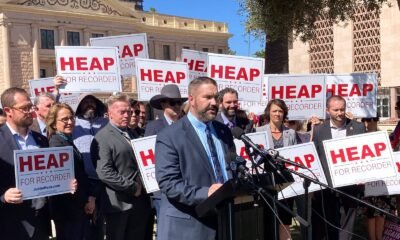Featured
Crisis Unfolds: Maricopa Advocate and Senator Clash Over Funding Fight for Disabled Kids

The Arizona State Capitol buzzed with activity today as advocates gathered for the annual Disability Day. This year’s event drew an unprecedented number of supporters, all voicing concerns about critical legislative proposals affecting disability rights.
Governor Katie Hobbs, addressing the crowd, highlighted the significance of the day. She is advocating for a 2% increase in provider rates, part of her recent budget proposal that aims to sustain vital programs like Parents as Paid Caregivers. This initiative allows parents to receive compensation for caring for their developmentally disabled children at home, a shift born out of the pandemic.
In stark contrast, Republican lawmakers have introduced their own budget plan, which proposes slashing funding for the Division of Developmental Disabilities (DDD) by 25%. This cut threatens to eliminate the Parents as Paid Caregivers program and adversely affect services for individuals with autism, cerebral palsy, epilepsy, Down syndrome, and other intellectual disabilities.
Contentions rose after Rep. David Livingston (R-Peoria) suggested cuts to services for disabled children, attracting criticism from Democratic leaders. Livingston claimed that “unlimited growth” in funding was unsustainable.
Returning to Disability Day, Governor Hobbs voiced her frustrations with Republican strategies. “The Division of Developmental Disabilities Funding is under threat because the legislative majority has decided that they want to use the people in this room as political pawns rather than serve you,” she asserted, directly addressing the vulnerable population gathered. Her statement highlighted the potential jeopardizing of the health and independence of over 60,000 Arizonans with disabilities.
Senator T.J. Shope (R-Coolidge) responded, accusing Hobbs of mismanaging funds. He argued that the legislature had previously made it clear that the pandemic-era funding program would not be extended and questioned the governor’s decision to override this directive. “This shortfall is entirely due to Gov. Hobbs’s malfeasance,” he claimed, signaling a sharp divide between the parties.
As this political dispute unfolds, parents like Ceylan Gentilella are left anxious about the future. Gentilella, a resident of Glennwilde and mother to an autistic child, expressed her concerns for families reliant on state funding for therapeutic services. “Right now, everything is just speculative,” she said, reflecting the uncertainty that many parents feel about the state’s budgetary decisions.
Meanwhile, federal lawmakers are also grappling with budget concerns, raising apprehensions among state advocates about potential cuts to assistance for Arizona’s poorest residents. The proposed changes may significantly impact the “expansion population,” which includes around 550,000 Arizonans living between 100 and 138% of the poverty line.


















